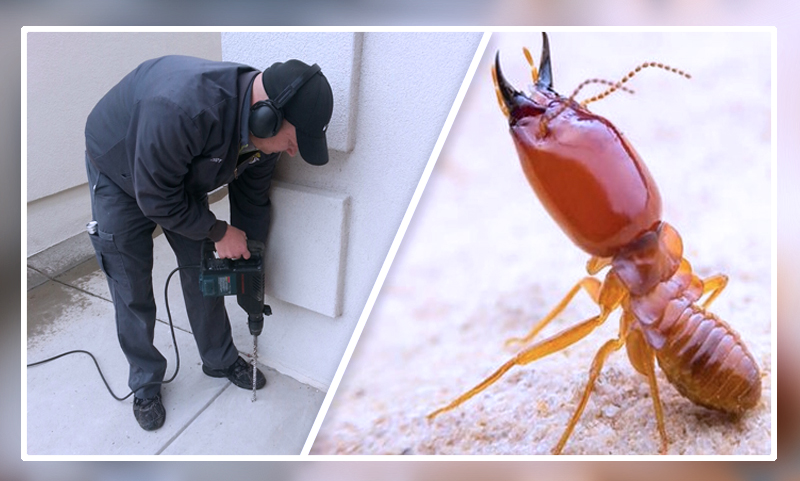Specialist Termite Control Services: Guard Your Home from Termite Damages
Specialist Termite Control Services: Guard Your Home from Termite Damages
Blog Article
Ecological Effect of Insect Control: Harmonizing Performance With Sustainability
The ecological impact of insect control is a crucial concern that requires a fragile equilibrium in between attaining performance in managing insects and making sure sustainability of our environments. From the usage of hazardous chemicals that leak into our dirt and water to the unplanned effects on non-target species, the repercussions of conventional insect control methods are far-ranging.
Unsafe Chemicals in Pest Control
The utilization of hazardous chemicals in insect control presents considerable environmental and health risks that call for cautious consideration and mitigation methods. Herbicides, pesticides, and pesticides are typically utilized to get rid of bugs, yet their prevalent application can cause unexpected repercussions. These chemicals can contaminate dirt, water sources, and the air, impacting not only the targeted parasites but likewise helpful bugs, wildlife, and human beings.

To address these threats, integrated bug management (IPM) methods are being advertised as a much more sustainable alternative. IPM entails a mix of methods such as organic control, environment control, and the targeted use chemicals as a last hope (ant control springs nc). By adopting an all natural technique to pest control, we can reduce the ecological and health influences related to hazardous chemicals while efficiently taking care of pest populaces
Effect On Non-Target Types
Thinking about the unintentional repercussions of bug control techniques, the effect on non-target species is an important element that needs thorough analysis. While bug control steps intend to target particular pests, other microorganisms in the ecological community may be inadvertently impacted. Non-target varieties, including beneficial insects, birds, creatures, and even plants, can suffer straight or indirect injury from pesticide applications or organic control approaches.
Pesticides developed to combat a specific bug parasite may hurt pollinators like or all-natural killers such as ladybugs. Organic control agents, if not species-specific, can pose threats to unintentional targets, disrupting the eco-friendly balance.
To reduce the effect on non-target types, incorporated pest management (IPM) strategies that emphasize a holistic method to pest control are advised. These approaches focus on the usage of ecologically friendly techniques, minimizing damage to advantageous microorganisms while successfully handling pest populaces. Performing detailed risk evaluations and keeping track of the outcomes of bug control initiatives are necessary action in safeguarding non-target varieties and promoting general ecological community health and wellness.
Soil and Water Contamination
Unintentional environmental repercussions of pest control methods prolong beyond influencing non-target varieties, with significant effects for soil and water contamination. Pesticides, herbicides, and chemical fertilizers used in parasite control can seep into the soil and contaminate groundwater, presenting a risk to both marine and earthbound environments. Dirt contamination can interrupt the balance of microbes crucial for nutrient cycling and plant growth, leading to reduced dirt fertility and performance. These chemicals can continue in the atmosphere for extensive periods, gathering in the dirt and possibly entering the food chain.
Water contamination is an additional essential concern associated with bug control practices. To alleviate dirt and water contamination from insect control activities, integrated pest monitoring strategies that focus on sustainability and decrease chemical inputs are crucial.
Air Air Pollution From Chemical Use
Exposure to air-borne chemicals during farming applications positions a significant issue for air pollution control measures. In addition, pesticide drift, where chemicals are brought by the wind to unplanned locations, can lead to the contamination of neighboring communities and water bodies.

Techniques for Lasting Parasite Control
In the world of agricultural techniques, implementing sustainable insect control methods is extremely important for maintaining ecological balance and securing plant returns. Lasting pest control emphasizes making use of eco-friendly approaches to take care of pest populations efficiently while reducing injury to non-target microorganisms and ecosystems. Integrated Insect Management (IPM) is a widely adopted method that combines biological, social, physical, and chemical control techniques to attain long-lasting parasite management solutions.
One key technique in sustainable pest control is advertising biodiversity within agroecosystems. By boosting all-natural opponents of bugs, such as killers and parasitoids, farmers can minimize the need for synthetic chemicals. Plant rotation and diversity are also reliable methods to interrupt pest life cycles and create much less positive conditions for bugs to prosper. Furthermore, using pest-resistant plant ranges and using strategies like catch cropping can aid lower insect pressure without counting heavily on chemical interventions. Inevitably, by incorporating these sustainable parasite control methods, farmers can achieve an equilibrium in between pest monitoring efficiency and ecological stewardship.
Verdict
In final thought, the ecological impact of bug control approaches need to be carefully considered to stabilize performance with sustainability. Harmful chemicals utilized in parasite control can cause dirt and water contamination, air contamination, and damage non-target varieties - ant control. It is crucial to carry out lasting insect control methods to decrease these negative effects on the atmosphere and advertise a healthier environment for future generations
By taking on an all natural approach to pest control, we can reduce the environmental and health and wellness influences associated with damaging chemicals while successfully handling pest populaces.

To reduce the air contamination caused by chemical use, it is essential to take on integrated bug management techniques that focus on the use of non-chemical bug control approaches, such as plant rotation, natural predators, and immune plant ranges. Lasting pest control highlights the use of eco ant control carrboro nc pleasant approaches to manage bug populaces efficiently while lessening injury to non-target organisms and ecological communities. Integrated Insect Monitoring (IPM) is an extensively adopted method that incorporates organic, cultural, physical, and chemical control methods to accomplish lasting parasite management services.
Report this page